
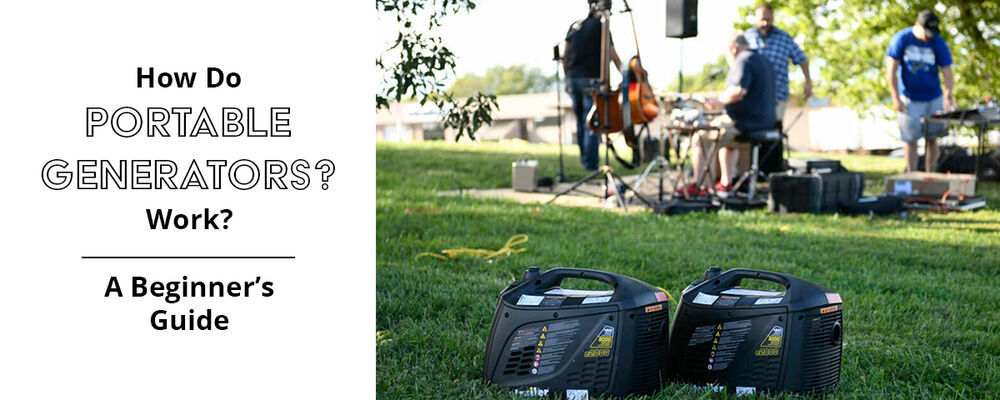
How Do Portable Generators Work? A Beginner's Guide to Powering Your Life
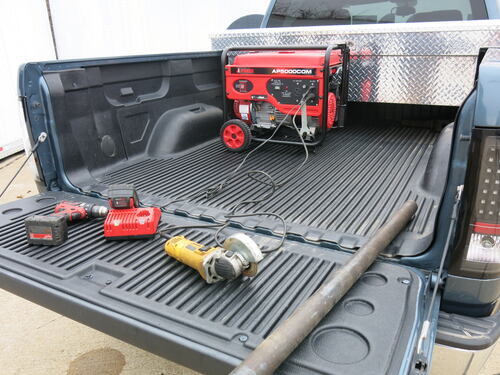
What Is a Portable Generator?
Portable generators are meant for off-grid power needs where an alternative electrical supply isn't readily available. For example, boondocking, backcountry camping, working at construction sites without electrical, and powering a single household in case of a power outage are situations where portable generators can be handy. As the name implies, these generators are designed to be moved around, some models more easily than others. Let's say the electricity in your house goes out. You will bring your portable generator outside of your house (you don't want to breathe in toxic fumes). Start the generator without anything plugged into it, and once it's started, run multiple extension cords from the generator to the appliances, like your fridge, you want to keep running. You can also run one generator cord into your house and connect the appliances to the cord. A generator cord plugs into your generator's 30-amp or 50-amp receptacle and, on the other end, has 120V outlets for plugging in appliances. The last solution is having a professional install a transfer switch between your generator and circuit breaker box. In case the transfer box loses power from the grid, the transfer box will start the generator and pull electricity from it instead. Many transfer switches are automatic, but you can purchase some that require you to manually move the switch to generator power, saving you about $50 to $100. A standby generator is meant for powering entire buildings in case of power outages and are fixed outside of the building. These generators cannot be moved around from place to place as they are heavy, large, directly wired to the building's electrical panel, and connected to fixed propane tanks or natural gas lines. You're not going to be taking these bad boys to the campsite with you.
Set up an outdoor movie theatre under the stars worthy of Instagram fame Power your power tools at construction sites that are not yet connected to the grid Be ready for power outages at your home to keep your refrigerated food from spoiling Explore more of the world by car camping and boondocking in backcountry locations Keep cool at the beach with fans and an electric cooler filled with your favorite drinks Blast your favorite music and blend up frozen lime margs at tailgates without draining your car's battery
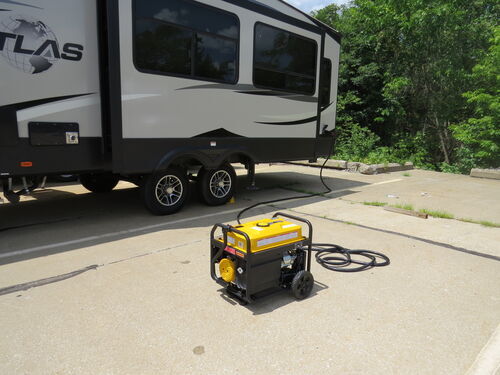
What Is a Portable Generator Used for in an RV?
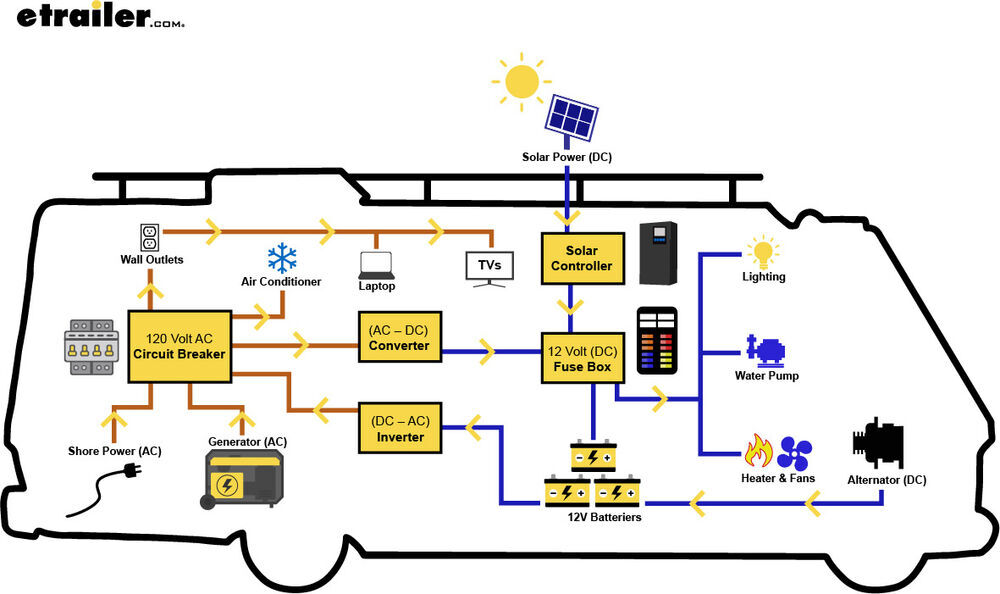
Generator Accreditation
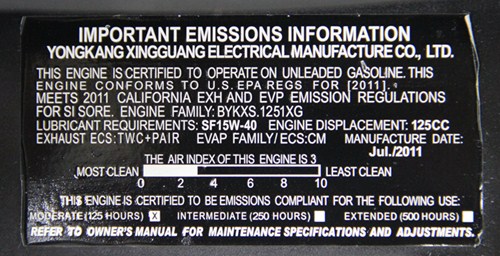
How Does a Generator Work?
What Do Inverter Generators Do?
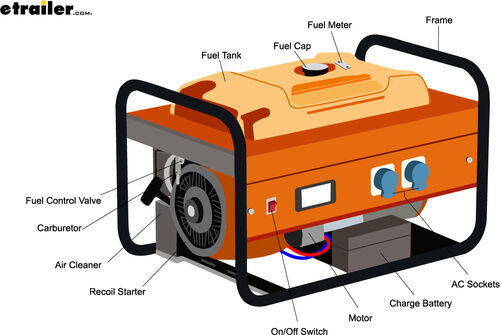
How Do I Connect a Portable Generator to My RV?
Determine your RV's amp requirement Your RV will either require 30-amp or 50-amp service. 30-amp inlets have space for 3 prongs, whereas 50-amp inlets have space for 4 prongs. Although you can use an adapter cord to connect your 30-amp generator to your 50-amp RV, realize you're not going to get 50-amp service. That means you may not be supplying sufficient power to all your appliances, like if you want to run two AC units. We recommend purchasing a generator that has the same available amperage that your RV requires. If your RV uses 50-amp service, purchase a generator that provides 50-amp service. To learn more about 30-amp and 50-amp service and adapters, read our helpful article linked below. Start your generator before connecting it to your RV Starting a generator creates a surge of electricity, so we advise you to not have anything plugged into your generator, including the shore cord, when starting the generator. Plug in the shore cord from your generator to your RV Connect the shore cord from your generator's 30-amp or 50-amp outlet to your RV's shore power inlet. As I mentioned in step 1, if your generator only supplies 30-amp power, and your RV uses 50-amp power, or vice versa, use a generator plug adapter or an RV plug adapter. Your generator is now supplying power to your RV!
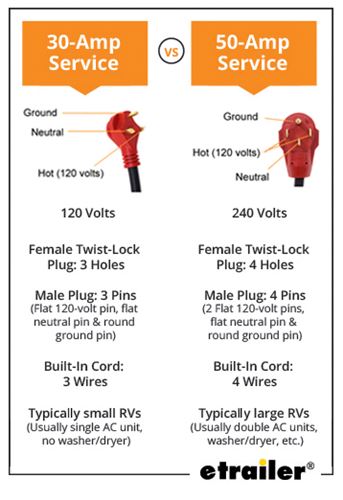
What Kinds of Fuel Does a Generator Use?
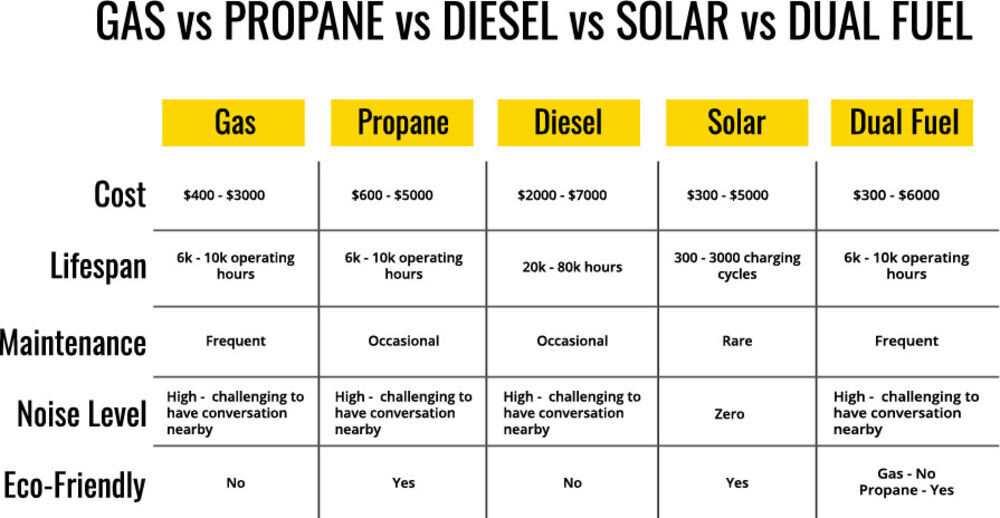
Why do I want a gas generator? This is the most common type of generator, which means it's easy to shop for, and replacement parts are readily available. Additionally, gas is less expensive than propane and diesel, making the fuel costs lighter on your wallet. Similar to fuel costs, gas generators are typically more affordable. Because this type doesn't require a large motor (like a diesel generator) or an external propane tank, gas generators usually take up less space. A great perk to gas generators is that you can fill up at any gas station as well, which makes refueling more convenient. Why do I not want a gas generator? Gas generators can require more maintenance than other types because the combustion of gas creates residue in the generator. Overall, some parts may wear more quickly. Another thing to consider is the location you'll be using the generator because gas generators can be difficult to start in cold weather. Gasoline motors don't combust liquid gasoline; they actually combust gas fumes mixed with air. Gasoline may not vaporize enough when it's freezing or below out, which means the gas can't combust properly. Maybe choose propane or dual-fuel if you plan to camp in cold climates. Lastly, while gasoline is readily available, there are times when there is a gasoline shortage or a power outage, and you can't actually get gasoline from the pump.

Why do I want a propane generator? Propane generators are the second most popular type of portable generator and are easy to find and purchase. This means you'll be able to find the necessary parts for maintaining your propane generator as well. A great benefit of propane is that is does not degrade nearly as quickly as gasoline, so you'll get a longer shelf-life from your fuel. Also, when it comes to refueling your propane generator, you don't have to stand in the rain while pouring gasoline into the generator. With propane, just disconnect the old tank then connect the new one. Even more so, you won't have to deal with spilling gasoline or choking on the fumes. Moreover, propane burns more cleanly than gas, which is better for the environment. You also don't have to deal with the same carbon deposits as you would with gas, leading to a longer lifespan of your generator's parts before requiring maintenance. I also want to mention that you shouldn't have as much of an issue using a propane generator in cold climates. Although propane is a liquid when under pressure, it has an incredibly low freezing point, -306 degrees Fahrenheit to be exact. However, if you're using a propane generator in subzero conditions day-in and day-out, it's possible for the propane to stay in a liquid state, rendering the generator useless because the propane won't combust. Why do I not want a propane generator? The first thing to note is that a propane generator requires an external propane tank to provide the fuel. Not only is this more equipment you need to purchase, but it also takes up more space. Also, an attached propane tank reduces the portability of the entire unit. In areas where space is limited or if you wish to house your generator in a vented compartment, you could run into a space issue. Depending on your vehicle, you may not have space for extra propane tanks, and it can be a pain to lug a propane tank to the generator. As far as cost goes, propane generators can be more expensive than similar gas versions; however, the difference may not be significant for some, perhaps only $150 to $200. The last drawback to propane generators is that you're dealing with a highly combustible gas stored at high pressure. Now, your tanks aren't going to spontaneously explode, but you have to take great care of storing your tanks securely, preventing them from rolling and knocking around.
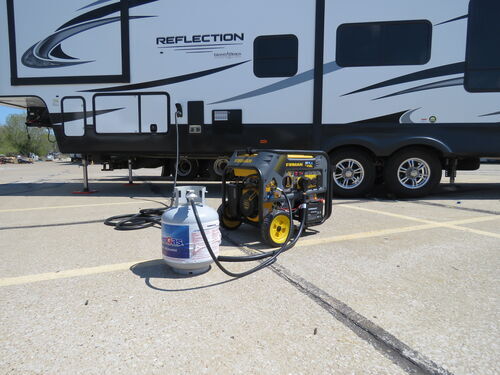
Why do I want a diesel generator? Diesel generators are extremely durable in comparison to other generators. It's possible to have your diesel generator with you for decades. Along with its durability, diesel fuel is also highly reliable. An issue you may have with a diesel generator is in a cold climate. Water condensation on the generator's parts can corrode the parts more quickly or also freeze some mechanical parts, making the generator unusable until it's warmer. Even though diesel fuel is more expensive than gas or propane, a diesel generator will run longer on one fill-up than gas or propane. Why do I not want a diesel generator? Diesel motors are much bulkier and heavier than gas and propane motors. This means that diesel generators will take up more space and may be challenging for some people to maneuver. I should also mention that diesel generators create a lot of exhaust, so you'll want to only run it in an area that has great air flow. If you're eco-conscious, you may not like the idea of pumping significant amounts of exhaust out in nature. Diesel fuel is not the easiest fuel to work with either. Diesel has a strong, harsh smell that many people find unpleasant, and if you spill diesel fuel on the ground or get it on your clothes, good luck cleaning it up. It's going to leave a residue, unlike gasoline that evaporates cleanly. The last drawback I want to mention is that diesel generators can struggle in humid, moist environments. The fuel line in diesel generators are sensitive to moisture, which can lead to corrosion and, ultimately, engine failure by throwing off the internal pressure used to combust the fuel.
Why do I want a solar generator? Solar generators are the newest type of generator on the market, and they use solar panels to absorb the sun's energy and an inverter to make AC voltage. If you are an environmentally-conscious person, you are probably drawn to reusable energy solutions, so a solar generator may be the generator for you. Unlike the other types of generators, you don't have to use fuel in a solar generator, which is a great perk. First, you'll save on fuel costs and save yourself trips to the gas station or the nearest propane refill location. Also, the generator will be significantly lighter than other types because it doesn't have a fuel supply and because it doesn't have a motor, engine, or alternator. Also, solar generators make no noise, cutting down on noise pollution. Solar generators can still be used in campsites that ban other generators or have "quiet times" at night. Lastly, solar generators emit zero emissions, which make the bunnies and deer happy too. Why do I not want a solar generator? There has to be some downsides along with all of the good of solar generators. Because solar generators use energy from the sun, solar generators take a long time to charge. If you run out of power, you're going to have to wait while the battery recharges. This is even more challenging during overcast weather or seasons where the sun is out for less time and hangs lower in the sky. On days like this, you'll need to conserve power by limiting your use of high-power-draw devices like AC units. People love that they don't have to worry about refueling their solar power systems; however, the fuel savings and convenience, come at a price. To set up a solar power system that provides 50-amp service can cost you up to 10 times what an equivalent gasoline generator would. Obviously, this is a big hit to the wallet, but a solar system of this caliber takes up a lot of space too. A final disadvantage of solar generators is that your power output is limited by the battery. The battery can only hold so much charge before it has to sit under the sun to recharge, if you're off the grid. You can’t just pop in a new LPG tank or fill it up with gasoline. However, solar generators can typically be charged by plugging them into a wall outlet.
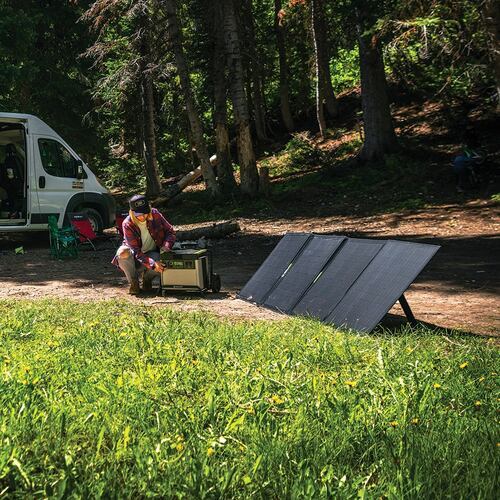
Why do I want a dual fuel generator? The most obvious advantage of a dual-fuel generator is that you have the option to choose which type of fuel you want to use in different instances, gasoline or propane. Let's say you're in an area where propane isn't available but there's a gas station up the street, you can still fuel the generator. You can even grab the gasoline from your lawn mower to fuel your generator. Or, imagine that gas prices skyrocket, so your best option is to use propane for a while. This is incredibly convenient and can help you save on fuel costs over time. The benefits of gas and propane generators can be applied to a dual-fuel generator as well. For example, if you're feeling more eco-friendly one day, you can use propane for a clean burn. Why do I not want a dual fuel generator? The flexibility of being able to use two different fuels means that the generator has to have the parts to accommodate both fuels. This increases the overall cost of the generator over that of a similar generator that uses only gas or propane, usually between $150 to $200. The added equipment also makes it slightly heavier, i.e. less maneuverable. Although the weight difference is usually around 10 to 20 lbs, so the weight increase might not be a big deal when looking at a large, 200-lb generator. Another thing to consider is that you'll have more overall maintenance because there are more parts involved. I want to finally mention that you will experience power output changes depending on which fuel type you use. You may find that your particular generator goes through gasoline more quickly than propane. You won't have a 1-to-1 ratio on fuel usage.
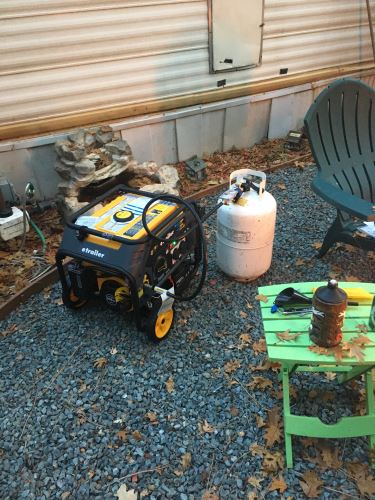
Can I Run a Generator While Driving My RV?
Warning: Generators Need to Be Vented
How Much Does a Portable Generator and Fuel Cost?
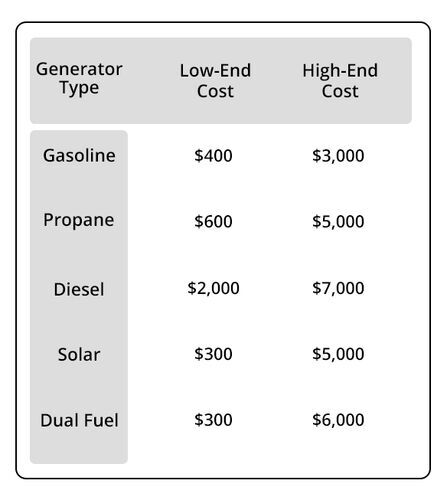
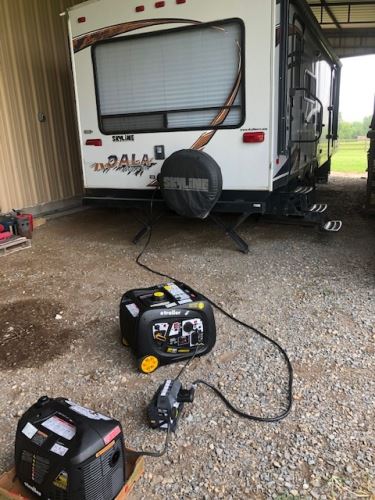
How Much Fuel Do Portable Generators Use?

What Size Generator Do I Need?
Find the starting (surge) watts and running (rated) watts for each device that you want to plug into the generator. Look for a sticker or plate on each device or check your owner's manuals. If your device or manual only shows amps and volts, watts can also be determined through a simple formula. (Amps x Volts = Watts). Make sure you use the AC amperage, not DC amperage when making this calculation. List all of your starting watts and running watts as seen in the table below. 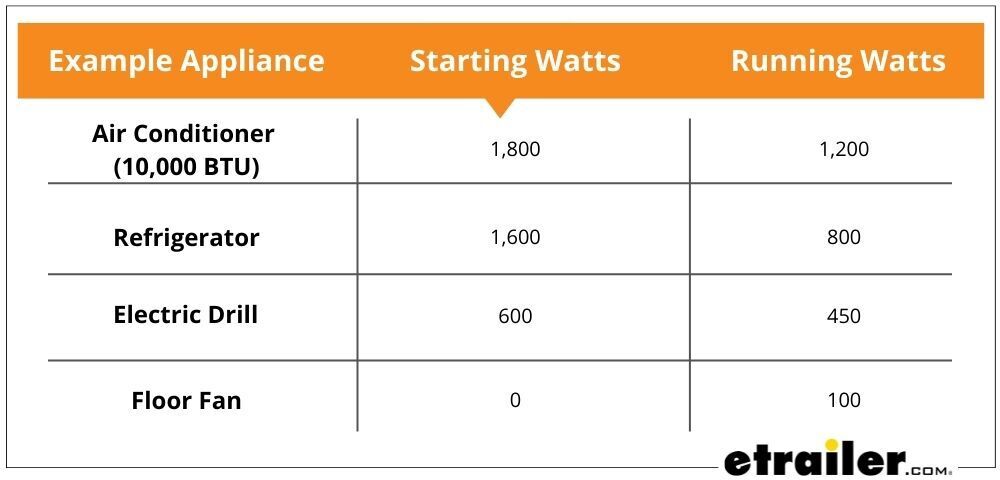
1,800 + 1,600 + 600 + 0 = 4,000 total starting watts
1,200 + 800 + 450 + 100 = 2,550 total running watts To run all of these devices simultaneously, you would require a generator with at least 4,000 starting watts and 2,550 running watts.
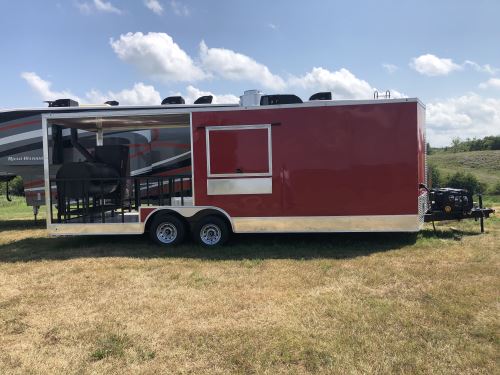
Do I Need an Inverter Generator?
Safe for Sensitive Electronics As I discussed earlier in this article, modern electronics like TVs, smartphones, tablets, and laptops are classified as sensitive electronics, meaning they are sensitive to voltage. Spikes in AC voltage can cause the electrical components to degrade more quickly. For this reason, if you plan on powering these types of devices from your generator, you should use an inverter generator. Produce Less Power Over Time Generally, inverter generators will produce less power, so if you have a lot of appliances and devices running off an inverter generator, you may need to invest in a parallel kit to daisy-chain multiple inverter generators. Quite Fuel-Efficient Unlike other generators, inverter generators control the engine RPMs up and down to match the power draw from electrical devices. This throttling results in saving fuel as the engine only runs at the intensity the devices need. This also means that if you only have a few devices receiving power from the generator, your generator can run for much longer than a comparable non-inverter generator. Make Less Noise Although an inverter generator still makes noise, the noise level is typically less than non-inverter generators. A noisy generator can ruin the serenity of nature, so people who camp at beautiful locations opt for an inverter generator to cut down on noise pollution.
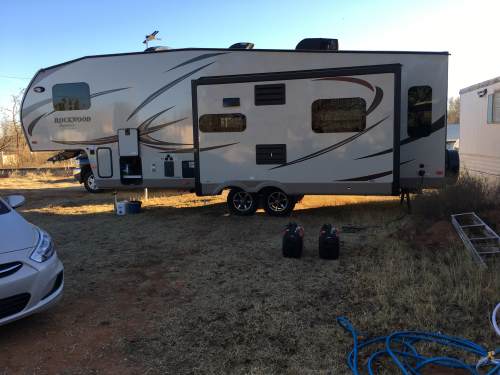
Do You Want a Portable Generator?

Fred
7/28/2021
I'm looking for a small generator to run once a day to charge the travel trailer battery. I would run it occasionally for the built-in microwave or a TV. The Champion 2500-Watt only has an 8-Amp DC output connection. At that rate, it would take almost 10 hours to fully charge the battery. As far as I can tell, the battery can get 30 Amps from the car, but that has to use more gas than a generator would. And it can't be efficient to let the trailer's AC to DC converter to charge the battery. Is my only option to buy a 12V DC generator and a second 120V AC inverter generator? Thanks!


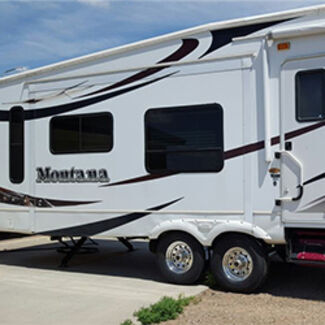
Vince D.
7/24/2021
Great explanation. One thing though. If your rv is plugged into any 120v power source, there is no need to run a separate feed to the dc panel. Your power converter will feed the dc panel without issue.
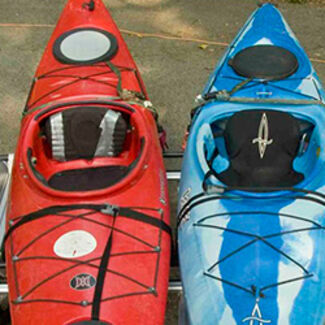
Will K.
7/23/2021
Excellent job. Very accurate and factual. You did your homework. I'm impressed.

Daniel S.
7/23/2021
Thanks for the great info. I am considering stitching a 2nd solar panel array into my boats Bimini Top for battery maintenance while anchored with the engine off, listening to music, making coffee, smoothies etc. I would love to learn more about "Fuel Cells" as a quiet alternative to generators and backup for my solar. Please consider doing an article on them. I haven't purchased a marine generator yet due to lack of space and noise. If you would also please share what you learned about the really quiet running smaller models suitable for a 21ft boat deck under the double back seat. I am running a 4kw12vdc to 120vac Marine Inverter, with 3 batteries, a starter battery for my boat Engine, a Deep Discharge for "cabin needs" and a 2nd 12v. A 200 amp alternator keeps batteries up while under way. Each battery has its own switch so I can use them individually or mix and match. Load includes 4 pc monitors (2 in cabin and 2 on deck) 2 fan-less computers, swamp cooler or cabin ac, underwater camera, anchor winch, flip down screen DVD player, mini refrigerator, 200 w cd/usb/am/fm stereo, sonar, active GPS 12v cooking appliances, etc. 45 W Solar Panel sewn into the Bimini top is mostly for keeping batteries full while boat is parked on the trailer. I really enjoy these etrailer articles pure edutainment! Educational and Entertaining! Thanks again, Dan
Departments
Towing
- Trailer Hitch
- Fifth Wheel
- Gooseneck
- Towing a Vehicle
- Front Hitch
- RV Hitch
- ATV Hitch
- HD Truck Hitch
- Vehicle Wiring
- Brake Controller
- Ball Mounts
- Weight Distribution
Sports and Recreation
Trailer Parts
- Utility Trailer
- Boat Trailer
- Landscape Trailer
- Enclosed Trailer
- 5th/Camper Trailer
- Car Hauler
- Horse Trailer
Vehicle
Contact & Help

What our customers are saying:
"Very helpful/friendly Customer Service. Competitive Pricing. Shipping was Fast."
Popular Vehicles
- Subaru Forester
- Ford F-350 Super Duty
- Ford F-250 Super Duty
- Chevrolet Silverado 1500
- Jeep Wrangler Unlimited
- Jeep Wrangler
- Ram 3500
- Toyota Highlander
- Ram 2500
- Chevrolet Silverado 2500
- Subaru Outback Wagon
- Chevrolet Silverado
- Dodge Ram Pickup
- GMC Sierra 2500
- Ram 1500
- Ford F-250 and F-350 Super Duty
- Jeep Grand Cherokee
- Toyota Tacoma
- GMC Sierra 3500
- Toyota Tundra
- Ford Escape
- More >>


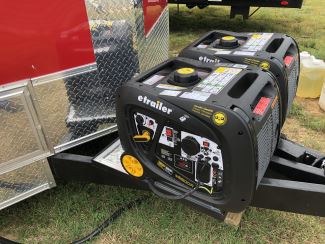
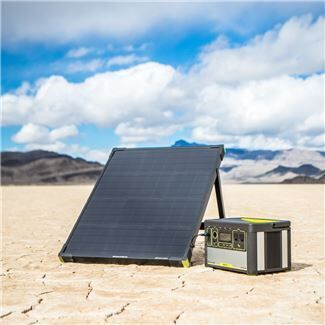
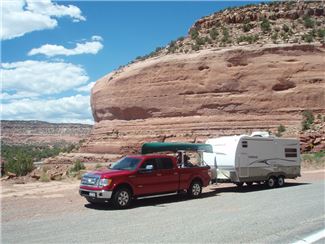
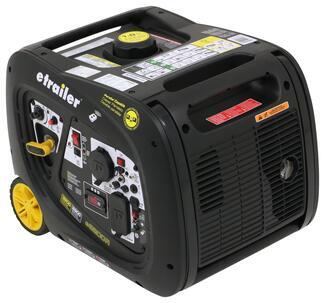
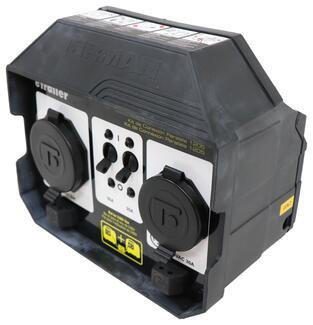
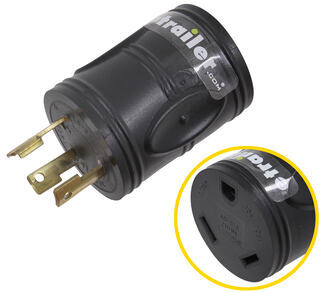

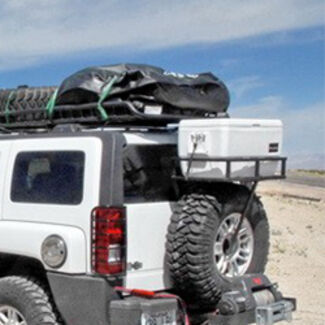


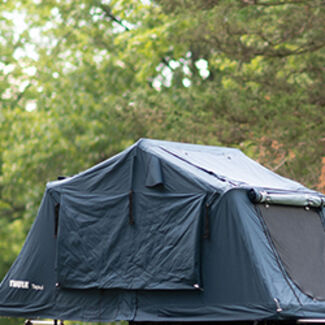












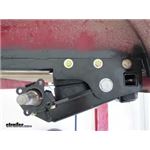







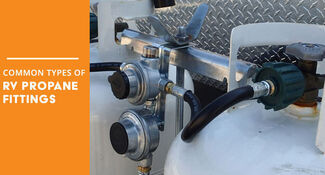



Ron V.
9/30/2021
I’m new to this. I’m getting a 4,000 watt generator for emergency use only to run two refrigerators and one freezer and maybe one or two outlets for TV or radio. Do I set the generator in my back patio and run extension cords to the appliances or what do I connect it to? What should my setup be?